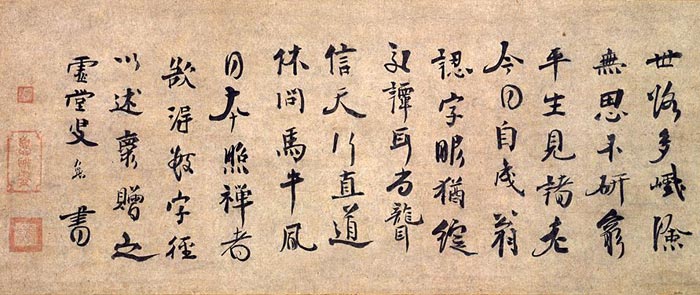Xutang Zhiyu (1185-1269), named Xutang, had a common surname of Chen. He was from Siming Xiangshan (today's Xiangshan, Ningbo, both books "Siming Tea Rhythm" and "Ningbo: The Place where the Sea Tea Road Sailed" were mistaken for Yinzhou). At the age of 16, monk Shiyun of Puming Temple in Jinyi became a monk. He successively studied in Fenghua Xuedou Temple, Zhenjiang Jinshan Temple, Jiaxing Xingsheng Temple, Baoen Guangxiao Temple, Qingyuan Prefecture (Ningbo) Xianxiao Temple, Wuzhou Yunhuangshan Baolin Temple, Qing He practiced and abboted at Guangli Temple in Asoka Mountain in Yuanfu (Ningbo), Jingci Temple in Lin'an Prefecture and other places. In the autumn of the first year of Xianchun of Du Zong (1265), he moved to Jingshan Xingsheng Wanshou Temple in accordance with the imperial decree and became the 40th abbot of the temple. He died in the fifth year of Xianchun (1269) at the age of 85. There are 10 volumes of "Quotations of Zen Master Xu Tang Zhiyu", which are included in "Xu Zang Jing". They are important quotations of Linji Sect and collect the French, verses and poems of Xu Tang Zhiyu. On October 11th of the 10th year of Xianchun (1274), Zen Master Fayun, the abbot of Qingliang Zen Temple in Qingyuan Prefecture, wrote "The Life of Zen Master Xutang Zhiyu".
Xutang Zhiyu was an eminent monk active in the Southern Song Dynasty. Many Japanese monks also worshiped under his disciples.

French, paper, running script, 28.5 x 70.0cm, collected by the Tokyo National Museum, Japan (gift from Naoryo Matsudaira)
This ink was written in French by Zen Master Xutang Zhiyu when he was about eighty years old, and addressed to "Japanese Zen Master" (Zone Zen Master refers to a monk who studies Zen, and French is an article explaining Buddhism).








